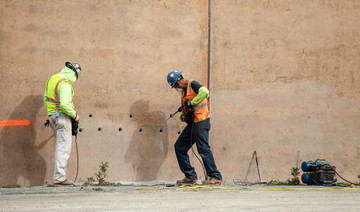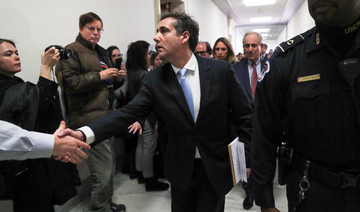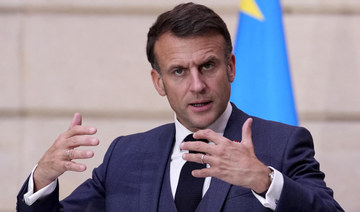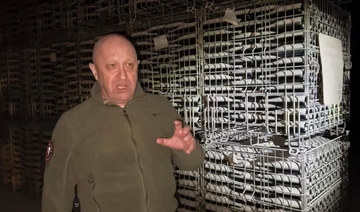HANOI: US President Donald Trump hailed “a very special relationship” with North Korean leader Kim Jong Un as they met in Vietnam for a second summit on Wednesday and said he was satisfied with the pace of denuclearization talks despite some criticism they were not moving quickly enough.
The US president appeared upbeat with Kim even as on the other side of the world in Washington his former personal lawyer Michael Cohen called Trump a “conman” who knew in advance about the release of stolen emails aimed at hurting his Democratic rival in the 2016 election campaign.
“Great meetings” and a “Very good dialogue,” Trump said on Twitter after dinner with Kim at Hanoi’s French-colonial-era Metropole hotel while the White House said the two planned to sign a “joint agreement” after further talks on Thursday.
Facing increasing political and legal pressure at home over investigations into Russian meddling in the 2016 US election, Trump has devoted significant time and effort to trying to persuade North Korea to give up its nuclear weapons in exchange for promises of peace and development, a foreign policy goal that has confounded multiple predecessors.
The Hanoi meeting was Trump’s second meeting with Kim in eight months and he appeared to reiterate recent statements that he was in no rush.
“We had a very successful first summit,” he told Kim. “I felt it was very successful, and some people would like to see it go quicker; I’m satisfied; you’re satisfied, we want to be happy with what we’re doing.”
Asked by a reporter if he was “walking back” on denuclearization demands, Trump said “no.”
Trump and Kim held a 20-minute, one-on-one chat before they sat down to dinner with US Secretary of State Mike Pompeo, Trump’s acting Chief of Staff Mick Mulvaney, Kim’s top envoy Kim Yong Chol and North Korean Foreign Minister Ri Yong Ho.
On Thursday, the two leaders are scheduled for a series of meetings at the Metropole, beginning with another one-on-one session lasting 45 minutes, the White House said.
The two leaders would hold a “joint agreement signing ceremony,” at the end of the meetings, which would be followed by a news conference by Trump at 3:50 p.m. Hanoi time (0850 GMT).
The White House has given no indication as to what the signing ceremony might involve, although the two sides have held discussions that have included the possibility of a political statement to declare the 1950-53 Korean War over, which some critics say would be premature.
Asked if he would declare a formal end to the Korean War, which concluded with an armistice, not a peace treaty that North Korea has long sought, Trump said: “We’ll see.”
Their summit in Singapore in June was the first meeting between a sitting US president and a North Korean leader and ended with fanfare but little substance.
Trump and Kim pledged to work toward denuclearization and permanent peace on the Korean peninsula, but there has been little progress since. Kim said they had overcome obstacles to meet a second time and praised Trump for his “courageous decision” to begin a dialogue.
“Now that we’re meeting here again like this, I’m confident that there will be an excellent outcome that everyone welcomes, and I’ll do my best to make it happen,” Kim said.
“We’re going to have a very busy day tomorrow,” a smiling, relaxed-looking Trump, said seated beside Kim at a round dinner table with the other four officials and two interpreters.
“Our relationship is a very special relationship.”
Observers said the pair were at pains to show their relationship had improved since June, with their body language closely mirroring each other.
Leverage
Trump said late last year he and Kim “fell in love,” but whether the bonhomie can move them beyond summit pageantry to substantive progress on eliminating a North Korean nuclear arsenal that threatens the United States is the big question.
Trump indicated a more flexible stance in the run-up to Hanoi, saying he was in no rush on denuclearization as long as North Korea, which has not tested a nuclear weapon or intercontinental ballistic missile since 2017, maintained that freeze.
Trump risks squandering vital leverage if he gives away too much, too quickly, critics said.
Evans Revere, a former US negotiator with North Korea, said Trump was under pressure given his domestic problems and “Kim may be tempted to push Trump even harder for concessions, knowing how much the president wants and needs that testing pause.”
Daniel Russel, who served as the top US diplomat for East Asia until early in Trump’s presidency, said telling Kim that he could take his time was anything but strategically wise.
“The yardstick for assessing ... results is not whether Trump proclaims himself ‘happy,’ but whether the outcome takes North Korea measurably closer to revealing and dismantling its nuclear and ballistic missile programs.”
US intelligence officials have said there is no sign North Korea will give up its entire arsenal of nuclear weapons, which Kim’s ruling family sees as vital to its survival, and analysts say Pyongyang is unlikely to commit to significant steps without an easing of punishing US-led sanctions.
The two sides have discussed partial denuclearization measures, such as allowing inspectors to observe the dismantlement of North Korea’s Yongbyon nuclear reactor, US and South Korean officials say.
US concessions could include opening liaison offices or clearing the way for inter-Korean projects.
Trump has appeared to be betting on his personal relationship with Kim, and the economic incentive after 70 years of hostility between their countries.
“Vietnam is thriving like few places on earth. North Korea would be the same, and very quickly, if it would denuclearize,” Trump said on Twitter ahead of the meeting.
Trump touts rapport with North Korea’s Kim at summit, ‘satisfied’ with talks
Trump touts rapport with North Korea’s Kim at summit, ‘satisfied’ with talks
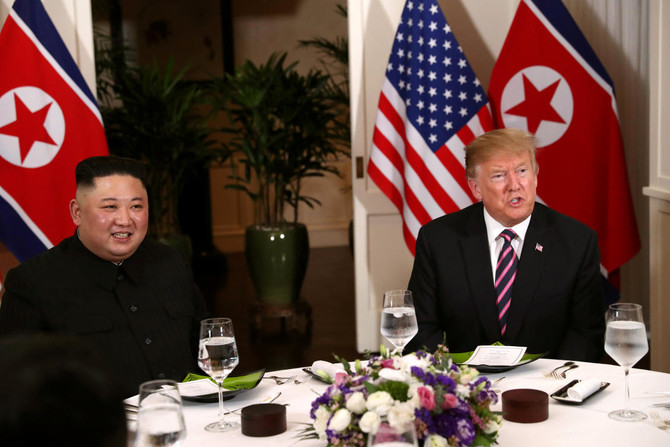
- Trump says ‘great opportunity’ for his ‘friend’ Kim
- US, North Korea leaders meet for second summit in Hanoi
Taliban deny Pakistani claims of Afghan involvement in attack on Chinese workers

- According to Islamabad, suicide attack that killed 5 Chinese in Pakistan was planned in Afghanistan
- Afghan Defense Ministry says the March attack showed weakness of Pakistan’s security agencies
KABUL: The Taliban on Wednesday rejected allegations of Afghan involvement in a recent deadly attack on Chinese workers in neighboring Pakistan.
The five Chinese nationals, who were employed on the site of a hydropower project in Dasu in northwestern Khyber Pakhtunkhwa province bordering Afghanistan, were killed alongside their driver in a suicide blast on March 26.
Pakistan’s military said on Tuesday that the attack was planned in Afghanistan and that the suicide bomber was an Afghan citizen.
Maj. Gen. Ahmad Sharif, a spokesperson for Pakistan’s army, also told reporters that Islamabad had “solid evidence” of militants using Afghan soil to launch attacks in Pakistan, that since the beginning of the year such assaults had killed more than 60 security personnel and that authorities in Kabul were unhelpful in addressing the violence.
The Taliban’s Ministry of Defense responded on Wednesday that the claims were “irresponsible and far from the reality.
“Blaming Afghanistan for such incidents is a failed attempt to divert attention from the truth, and we strongly reject it,” Enayatullah Khwarazmi, the ministry’s spokesperson, said in a statement.
“The killing of Chinese citizens in an area of Khyber Pakhtunkhwa, which is under tight security cover of the Pakistani army, shows the weakness of the Pakistani security agencies or cooperation with the attackers.”
The Dasu attack followed two other major assaults in regions where China has invested more than $65 billion in infrastructure projects as part of its wider Belt and Road Initiative.
On March 25, a naval air base was attacked in Turbat in Pakistan’s Balochistan province, and on March 20, militants stormed a government compound in nearby Gwadar district, which is home to a Chinese-operated port.
Pakistan is home to twin insurgencies, one by militants related to the Tehreek-e-Taliban Pakistan — the Pakistani Taliban — and the other by ethnic separatists who seek secession in southwestern Balochistan province, which remains Pakistan’s poorest despite being rich in natural resources.
While the attacks in Balochistan were claimed by the Baloch Liberation Army — the most prominent of several separatist groups in the province, no group claimed responsibility for the one in Dasu.
Blaming it on Afghanistan, however, was “baseless,” according to Naseer Ahmad Nawidy, an international relations professor at Salam University in Kabul.
“The insurgency in the region has existed for very long now and cannot be attributed to a specific area or country. Pakistan looks at the Islamic Emirate in its current form as a threat to its interests. The Pakistan government needs to develop its relations with the Islamic Emirate based on equal rights and goodwill for stability in the whole region,” Nawidy told Arab News.
“Stability in the region requires mutual cooperation and trust. The governments in Afghanistan and Pakistan must end the relations crisis at the earliest. Repeating such claims will further increase the tensions and may cause enmity between the two countries.”
Abdul Saboor Mubariz, a political scientist and lecturer at Alfalah University in Jalalabad, said that Pakistan’s claims were meant to put pressure on the Taliban to help Islamabad in its campaign against the TTP.
“Pakistan’s government is using different forms of pressure such as forcible deportation of Afghan refugees, claims about security threats from Afghanistan, closing border points and creating challenges for Afghan traders,” he said, adding that accusations and claims of links to attacks were affecting the Taliban administration as it still sought recognition from foreign governments.
“The claims are critical for the Islamic Emirate as it is seeking engagement with the countries in the region and across the globe, while the government remains unrecognized by all world countries.”
India PM Modi’s party deletes X post accused of targeting Muslims

- Video featured opposition politicians scheming to abolish programs for marginalized Hindus, distribute them to Muslims
- India’s PM Modi, expected to win polls, has made controversial remarks in election speeches, referring to Muslims as “infiltrators”
New Delhi: Indian Prime Minister Narendra Modi’s party on Wednesday deleted a cartoon video posted on social media platform X that was criticized for targeting minority Muslims during an ongoing national election.
India’s election code bans campaigning based on “communal” incitement but the Hindu-nationalist Bharatiya Janata Party (BJP) has frequently invoked the country’s main religious divide on the campaign trail.
The video, posted by an official BJP account, featured caricatures of opposition politicians scheming to abolish special affirmative action programs for marginalized Hindu groups and instead distribute them to Muslims.
The election commission wrote to the platform’s Indian office on Tuesday saying the “objectionable” post violated Indian law.
On Wednesday the original post had disappeared from the platform, with a notice saying it had been deleted.
A police complaint filed by the opposition Congress party accused the video of promoting “enmity between different religions.”
Modi, who is widely expected to win a third term in office when the six-week general election concludes next month, has made similar claims to the video in campaign appearances since last month.
He has used public speeches to refer to Muslims as “infiltrators” and “those who have more children,” prompting condemnation from opposition politicians, who have complained to election authorities.
On Tuesday he again said that his political opponents would “snatch” affirmative action policies meant for disadvantaged Hindus and redirect them to Muslims.
Modi remains widely popular a decade after coming to power, in large part due to his government’s positioning of the nation’s majority faith at the center of its politics, despite India’s officially secular constitution.
That in turn has made India’s 220-million-plus Muslim population increasingly anxious about their future in the country.
The BJP last month published another contentious animated video on Instagram in which a voiceover warned that if the opposition came to power, “it will snatch all the money and wealth from non-Muslims and distribute them among Muslims, their favorite community.”
The video was removed after several users reported it for “hate speech.”
UK says to expel Russian defense attache as ‘undeclared military intelligence officer’
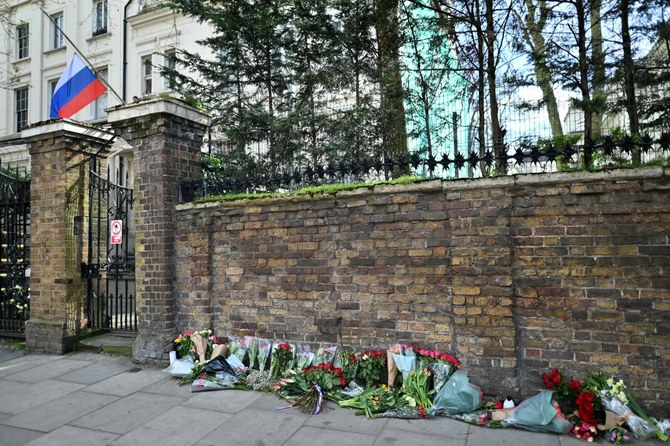
- Interior minister James Cleverly told parliament the UK would also remove the diplomatic status of several Russian-owned properties
- UK is currently a staunch NATO backer of Ukraine
London: The UK government on Wednesday raised tensions with the Kremlin by announcing it would expel a Russian defense attache for being “an undeclared military intelligence officer.”
Interior minister James Cleverly told parliament the UK would also remove the diplomatic status of several Russian-owned properties, including one in Sussex, southern England, and another in London “which we believe have been used for intelligence purposes.”
There would also be new restrictions on Russian diplomatic visas such as a cap on the length of time Russian diplomats can spend in the UK, he added.
The move comes with the UK concerned at an apparent increase in “malign” Russian activity on UK soil, including an arson attack on a Ukrainian-linked business allegedly orchestrated by the Kremlin.
A British man who it is claimed has links to the Wagner Group was charged in connection with that case last month.
London has previously accused Moscow of being behind the poisoning of two Russian former agents on UK soil, and of a spate of cyberattacks and disinformation campaigns.
The UK is currently a staunch NATO backer of Ukraine, providing training for troops and military equipment in the fightback against Russia.
Cleverly said the new package of measures was intended “to make clear to Russia that we will not tolerate such apparent escalations.”
He warned that Moscow would make accusations of Russophobia and spread conspiracy theories in response to his announcement.
“This is not new and the British people and the British Government will not fall for it, and will not be taken for fools by (President Vladimir) Putin’s bots, trolls and lackeys.
“Russia’s explanation was totally inadequate. Our response will be resolute and firm.
“Our message to Russia is clear: stop this illegal war, withdraw your troops from Ukraine, cease this malign activity.”
Four arrested for duping young Indian men into fighting for Russia in Ukraine
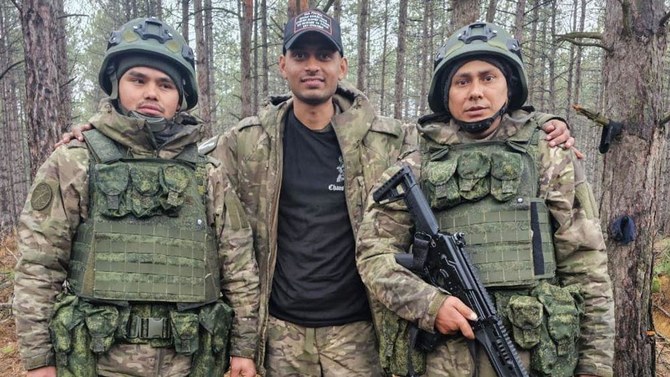
- Families of two Indian men who were killed in the war said that they had gone to Russia expecting to work as ‘helpers’ in the army
- At least 200 Nepalis are estimated to be serving in the Russian army and about 100 are missing
NEW DELHI: Indian police said four people linked to a network of human traffickers have been arrested on suspicion of luring young men to Russia with the promise of lucrative jobs or university places only to force them to fight in the war in Ukraine.
About 35 Indian men were duped in this manner, the Central Bureau of Investigation (CBI) said in March.
The four Indian nationals arrested were a translator, a person facilitating visa processing and the booking of airline tickets as well as two “main recruiters” for the southern states of Kerala and Tamil Nadu, the CBI said late on Tuesday.
The investigation “is continuing against other accused persons who are part of this international network of human traffickers,” the CBI said.
The families of two Indian men who were killed in the war have told Reuters they had gone to Russia expecting to work as “helpers” in the army.
India’s foreign ministry says each case has been “strongly taken up” with Russia. Moscow has not responded to repeated requests from Reuters for comment.
Other South Asian countries have also warned their citizens against such trafficking networks after multiple cases emerged of people being similarly duped into fighting in the Russian army.
Sri Lanka said on Wednesday that “a number” of its retired war veterans were lured to the Russia-Ukraine war front with the promise of a “handsome salary,” citizenship, and other benefits for serving in the army, none of which were granted.
“A significant number of war veterans have died and sustained injuries on the battlefield,” Sri Lanka’s Defense Ministry said, adding that the law would be “strictly enforced” in the matter.
A retired major and an employment agent have been arrested in this connection.
Nepal, which paused issuing work permits for Russia and Ukraine in January, has said several young unemployed Nepalis had been illegally recruited into the Russian army by agents who charged them hefty sums for visas.
At least 200 Nepalis are estimated to be serving in the Russian army and about 100 are missing, officials have said.
India has refused to condemn Russia over the war, calling instead for dialogue and diplomacy to end the conflict. The two countries have enjoyed a close relationship for decades, trading in items from fighter jets to tea.
India has also increased its purchase of cheap Russian oil since the war, with Moscow emerging as its top oil supplier in the last financial year for the second year in a row.
Police clearing Pro-Palestinian tent encampment at George Washington University, dozens arrested
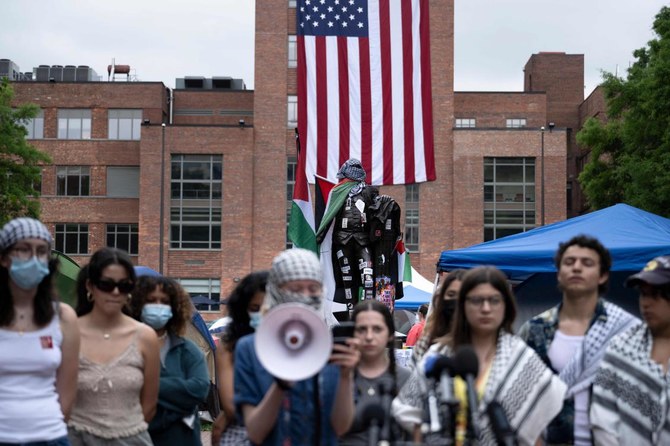
- A pro-Palestinian tent encampment was cleared at the University of Chicago on Tuesdday
- Tensions have continued to ratchet up in standoffs with protesters on campuses across the US
WASHINGTON: Police began to clear a Pro-Palestinian tent encampment at George Washington University early Wednesday and arrested dozens of protesters, hours after dozens left the site and marched to President Ellen Granberg’s home.
Officials at the university in Washington, D.C., had warned of possible suspensions for students engaging in protest activities on University Yard.
“While the university is committed to protecting students’ rights to free expression, the encampment had evolved into an unlawful activity, with participants in direct violation of multiple university policies and city regulations,” the university said in a statement.
Local media had reported that some protesters were pepper sprayed as police stopped them from entering the encampment and nearly 30 people had been arrested, according to community organizers.
In a statement, the District of Columbia’s Metropolitan Police Department said arrests were made for assault on a police officer and unlawful entry, but a number of arrests wasn’t immediately given. The department said it moved to disperse demonstrators because “there has been a gradual escalation in the volatility of the protest.”
Tuesday evening, protesters carrying signs that read, “Free Palestine” and “Hands off Rafah,” marched to Granberg’s home. Police were called to maintain the crowd. No arrests were made.
This comes as Mayor Muriel Bowser and MPD Chief Pamela Smith are set to testify about the District of Columbia’s handling of the protest at a House Committee on Oversight and Accountability hearing on Wednesday afternoon.
A pro-Palestinian tent encampment was cleared at the University of Chicago on Tuesday after administrators who had initially adopted a permissive approach said the protest had crossed a line and caused growing concerns about safety.
University President Paul Alivizatos acknowledged the school’s role as a protector of freedom of speech after officers in riot gear blocked access to the school’s Quad but also took an enough-is-enough stance.
“The university remains a place where dissenting voices have many avenues to express themselves, but we cannot enable an environment where the expression of some dominates and disrupts the healthy functioning of the community for the rest,” Alivizatos wrote in a message to the university community.
Tensions have continued to ratchet up in standoffs with protesters on campuses across the US — and increasingly, in Europe — nearly three weeks into a movement launched by a protest at Columbia University. Some colleges cracked down immediately on protests against the Israel-Hamas war. Among those that have tolerated the tent encampments, some have begun to lose patience and call in police over concerns about disruptions to campus life, safety and the involvement of nonstudents.
Since April 18, just over 2,600 people have been arrested on 50 campuses, figures based on AP reporting and statements from universities and law enforcement agencies.
But not all schools are taking that approach, with some letting protesters hold rallies and organize their encampments as they see fit.
The president of Wesleyan University, a liberal arts school in Connecticut, has commended the on-campus demonstration — which includes a pro-Palestinian tent encampment — as an act of political expression. The camp there has grown from about 20 tents a week ago to more than 100.
“The protesters’ cause is important — bringing attention to the killing of innocent people,” university President Michael Roth wrote to the campus community Thursday. “And we continue to make space for them to do so, as long as that space is not disruptive to campus operations.”
The Rhode Island School of Design, where students started occupying a building Monday, affirms students’ rights to freedom of speech and peaceful assembly and supports all members of the community, a spokesperson said. The school said President Crystal Williams spent more than five hours with the protesters that evening discussing their demands.
On Tuesday the school announced it was relocating classes that were scheduled to take place in the building. It was covered with posters reading “Free Palestine” and “Let Gaza Live,” and dove was drawn in colored chalk on the sidewalk.
Campuses have tried tactics from appeasement to threats of disciplinary action to resolve the protests and clear the way for commencements.
At the University of Chicago, hundreds of protesters gathered for at least eight days until administrators warned them Friday to leave or face removal. On Tuesday, law enforcement dismantled the encampment.
Officers later picked up a barricade erected to keep protesters out of the Quad and moved it toward the demonstrators, some of whom chanted, “Up, up with liberation. Down, down with occupation!” Police and protesters pushed back and forth along the barricade as the officers moved to reestablish control.





